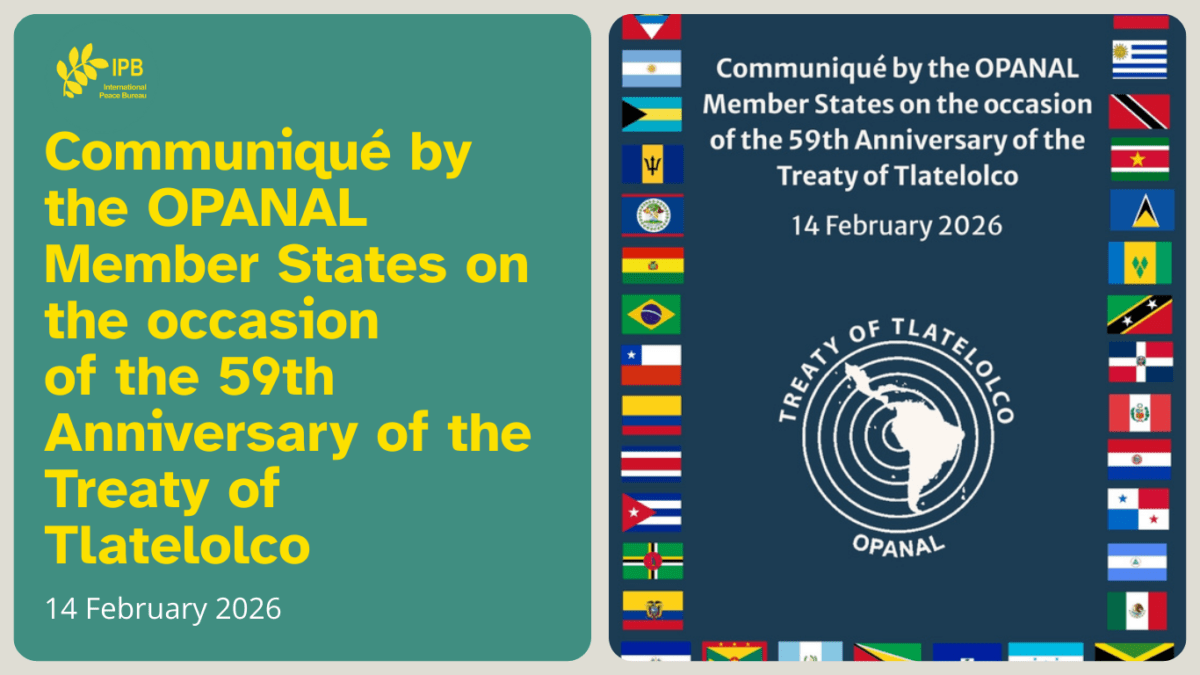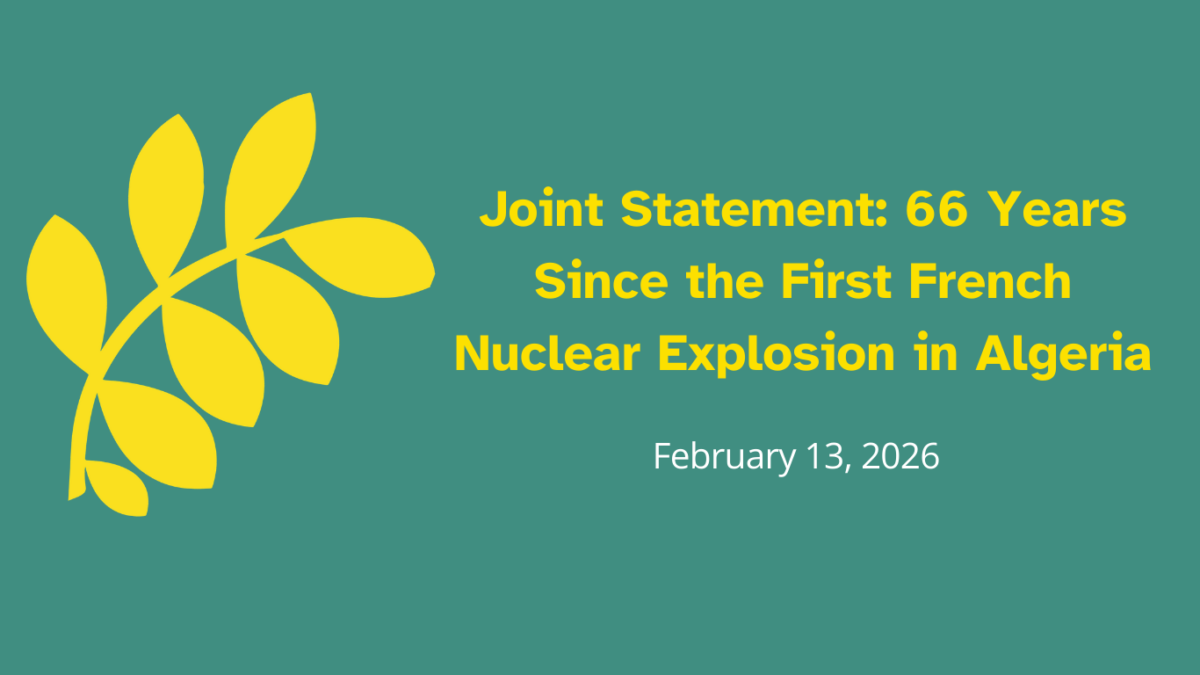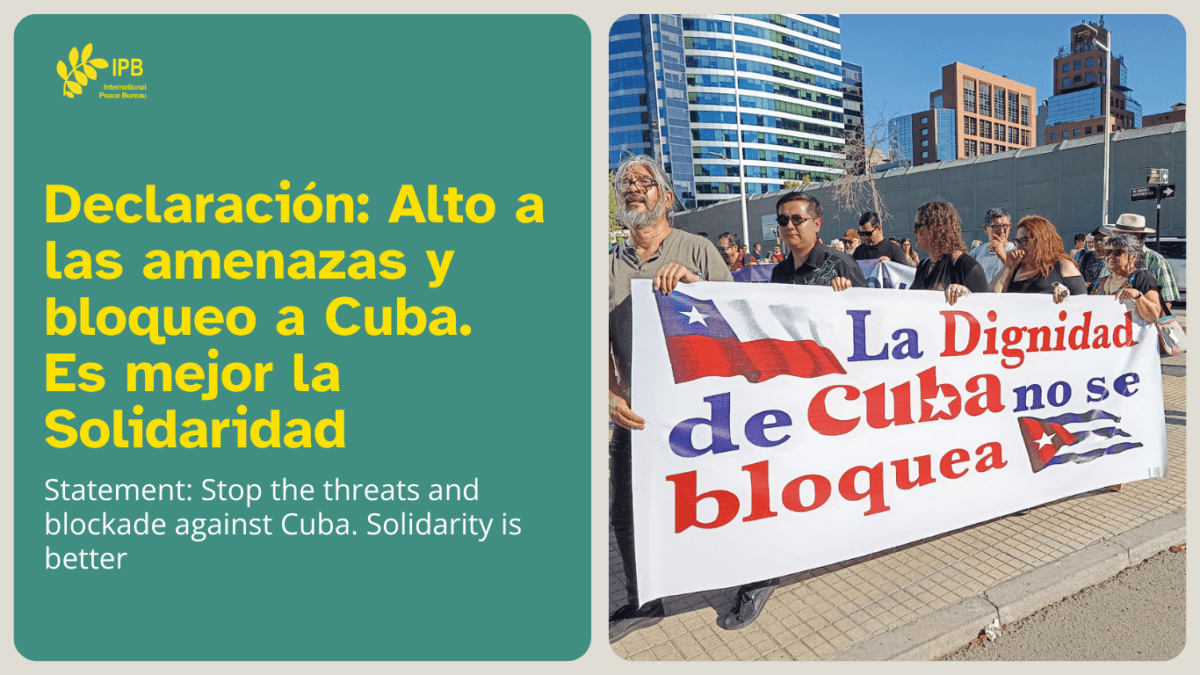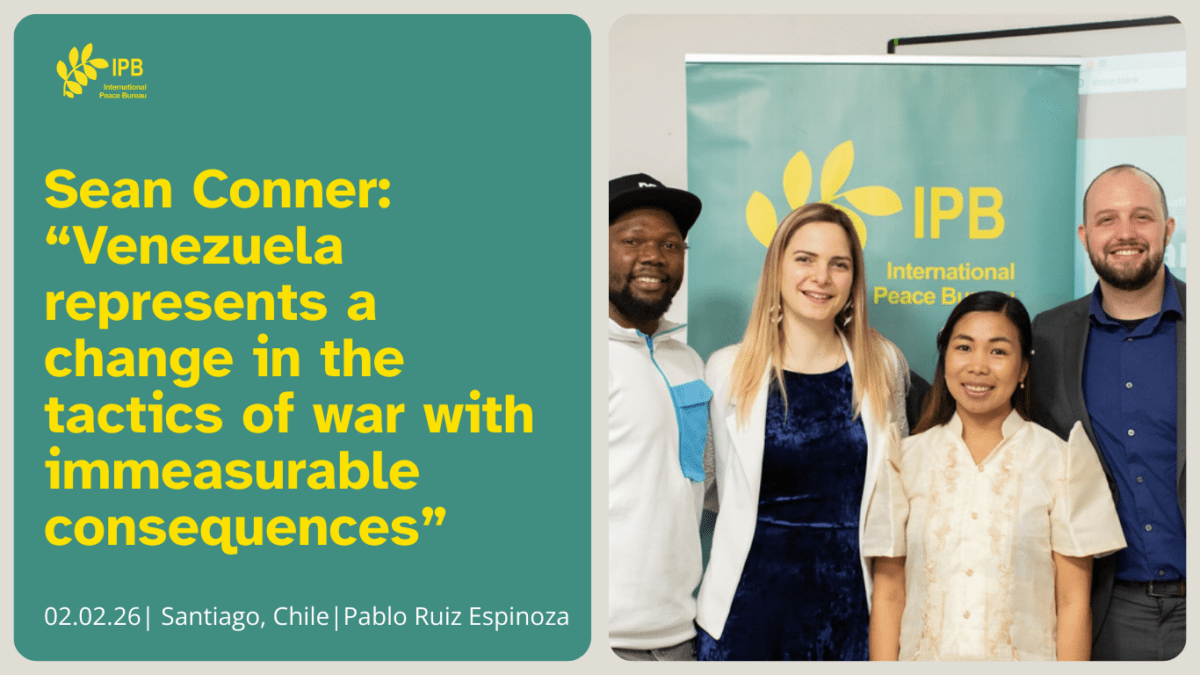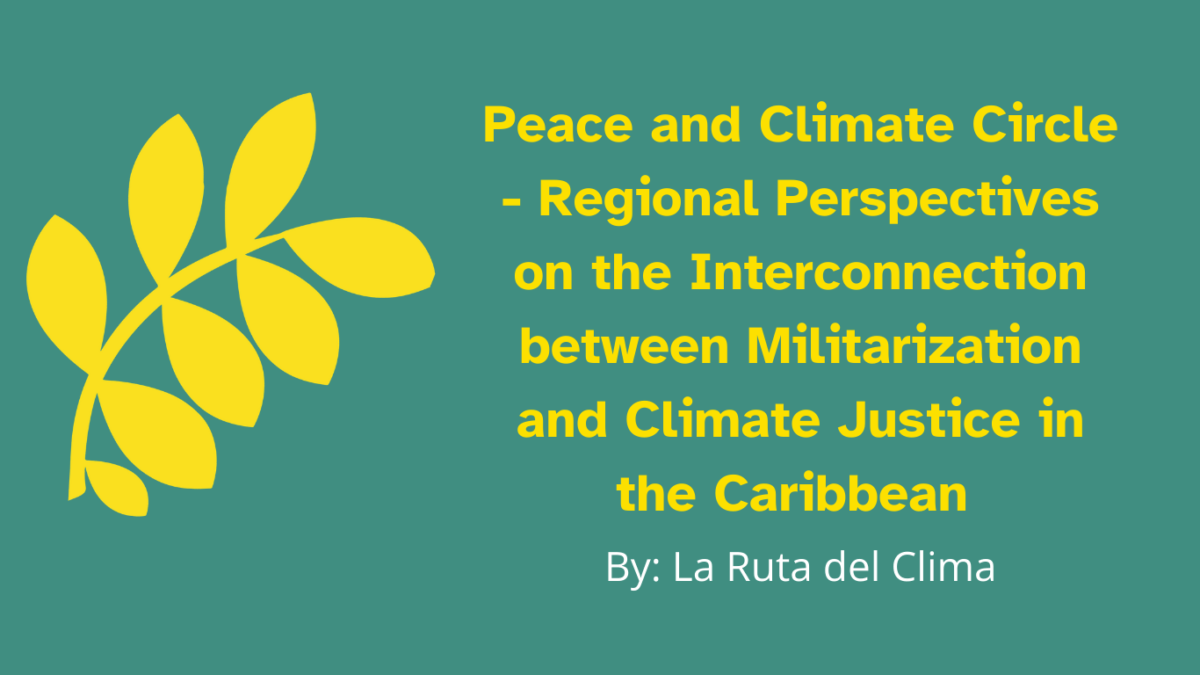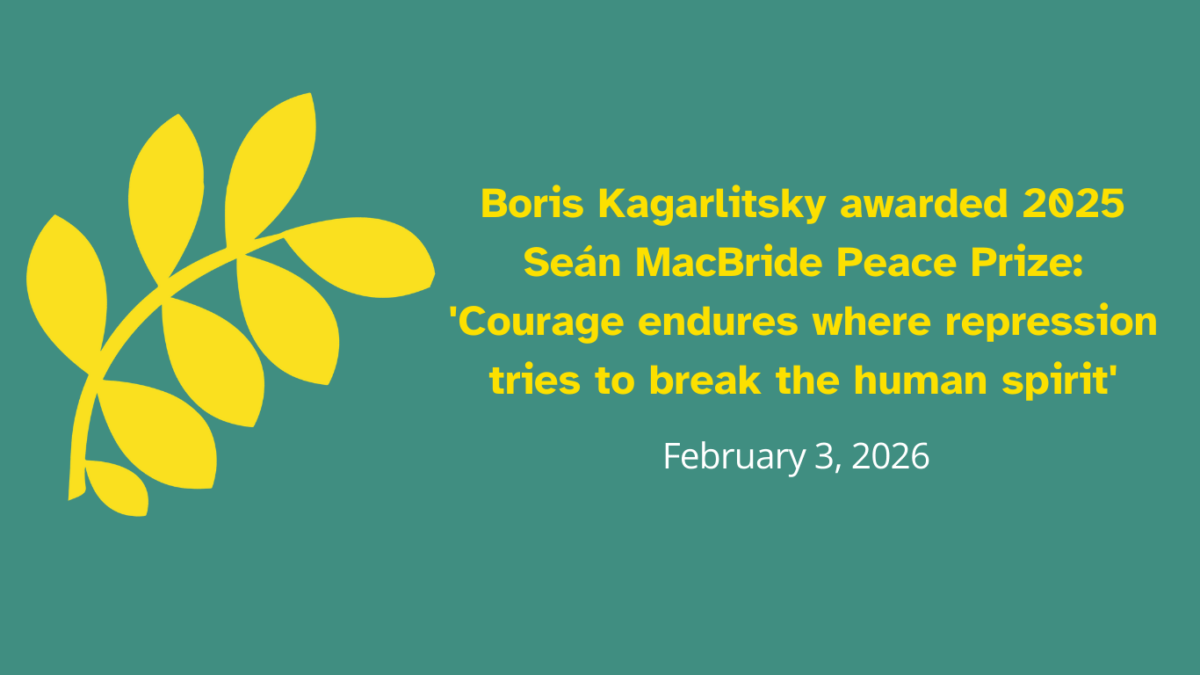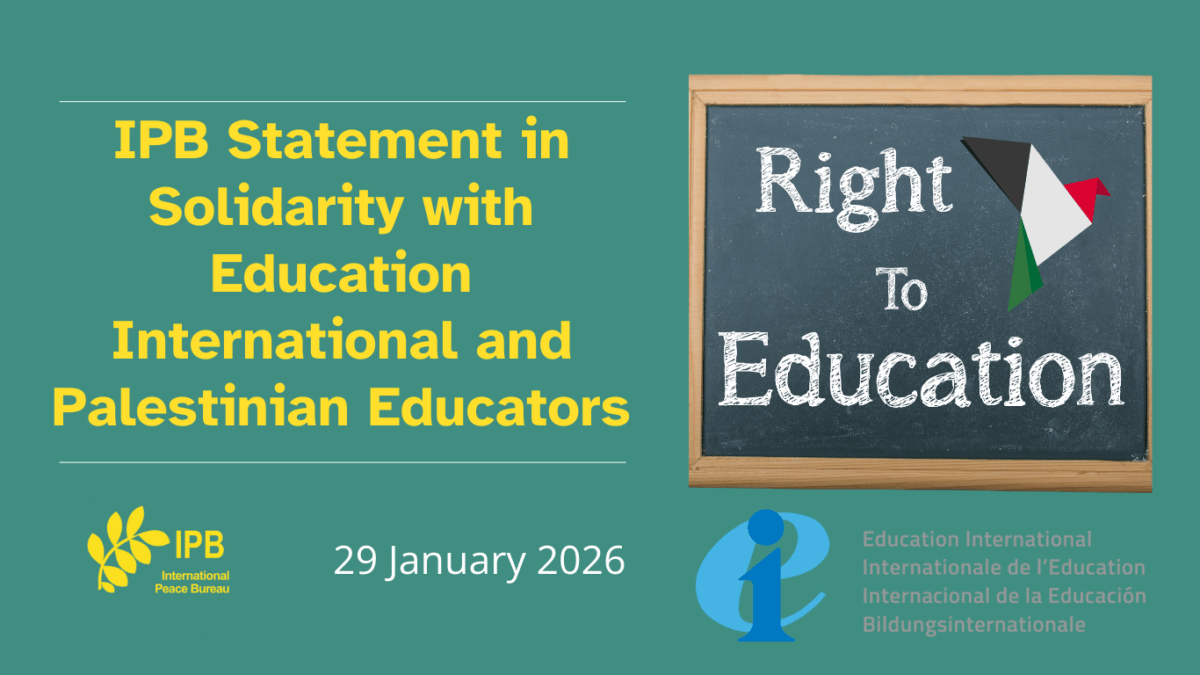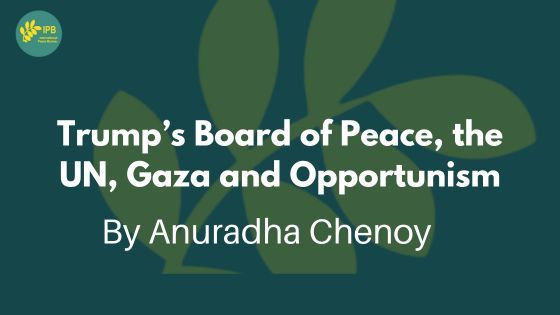By Anuradha Chenoy
Anuradha Chenoy is an IPB Board member. The thoughts in this article are
her own and do not necessarily reflect those of the IPB.
Nothing can be more cynical than President Donald Trump’s proposal for a new “Board of Peace” (BoP). Marketed as an international peace-building organization, this initiative would enact a self-serving mechanism that bypasses established international institutions while offering a premium seat on the table of global affairs in exchange for a $1 billion membership fee.
Read more: Trump’s Board of Peace, the UN, Gaza and Opportunism
The BoP originates from Security Council Resolution 2803, 2025, which calls for a comprehensive plan to end the Gaza conflict, establishing a transitional body until 2027. This resolution contains specific mandates: an international stabilization force to facilitate the Israeli Defense Forces’ withdrawal and the full resumption of humanitarian aid through UN cooperation.
While the BoP is presented as a nimble and effective peace-delivering body, its Charter nevertheless omits any mention of Gaza. Instead, it transforms the peacekeeping mandate of the 2803 Resolution into a self-serving and self-gratifying body that criticizes the United Nations. Trump’s claim of the need to depart from approaches and institutions that have too often failed is his way of delegitimizing the UN. This criticism of international institutions is consistent with the US withdrawal from approximately 60 UN bodies under Trump’s administration.
Trump: Self-proclaimed emperor of world peace
The BoP Charter establishes Trump as the “inaugural Chairman” and the US representative with extraordinary powers that effectively create a lifetime position. The Chairman possesses exclusive authority to create, modify or dissolve any entity within the BoP, control membership invitations and dismissals and designate successors. Only if the Chairman is incapacitated can the Executive Board unanimously decide on a replacement. In other words, these provisions essentially declare Trump the emperor of world peace with his handpicked council.
The founding Executive Board reveals the nature of his intents. Members include Trump’s son-in-law Jared Kushner, Secretary of State Marco Rubio, builder friend Steve Witkoff, former British Prime Minister Tony Blair, World Bank President Ajay Banga and billionaire private equity chief Marc Rowan, blending family connections, political allies and corporate power, exposing the BoP’s private interests.
The $1 billion fee
While member states will serve a three-year term, they can secure permanent seats for over $1 billion. This creates a two-level system, where wealthy states using taxpayer money can purchase permanent influence over international peace efforts. Member states will be the funders of the BoP, along with unspecified “organizations”, which will likely be major technology companies openly supporting Trump and profit from global affairs.
The Charter declares that the BoP possesses “international legal personality with authority to enter contracts for its missions and for financial purposes. Disputes between members will be solved through “amicable collaboration”, with the Chairman having the final say. For example, both India and Pakistan have been invited to join; they could resolve disputes here, with the Chairman having the final say. This framework privatizes international diplomacy, transforming peace-building into a commercial opportunity controlled by those who can afford its entry.
Gaza: a real estate opportunity
The White House announced a Gaza Executive Board consisting of Kushner, Witkoff, Blair, Bulgarian billionaire Nikolai Mladenov, Turkish Foreign Minister Hakan Fidan and Qatari diplomat Ali al-Thawadi. Israel has vociferously objected to the Turkish and Qatari names and is lobbying to reject this Board.
This Board will oversee a National Committee for the Administration of Gaza comprising Palestinian technocrats as administrators. What is notably absent from these arrangements is any reference to Palestinian rights, interests, rehabilitation, land, livelihood or statehood. The focus appears directed toward reconstruction contracts rather than justice or self-determination.
Meanwhile, the Israeli genocide continues in Gaza, sometimes under cover of other international events like Greenland’s fate or Ukraine’s dark bitter winter. On January 21, 2026, Israel seized and destroyed the UN Relief and Works Agency (UNRWA) for Palestine, a blatant violation of international law that leaves Gaza with minimum support for its besieged population. Gaza health authorities report 70,000 people have been killed in this strip, with survivors being traumatized and besieged. So, the reconstruction question becomes: who benefits from rebuilding what some consider prime Mediterranean real estate?
Global reactions to the BoP
Countries such as Pakistan, Israel, UAE, Egypt, Saudi Arabia, Turkey, Qatar, Argentina, Hungary and Belarus have announced their intent to join the BoP. These are countries hoping to secure lucrative reconstruction contracts while accessing Trump’s inner circle. Russia is considering using frozen European-held assets to pay the $1 billion permanence fee. France’s refusal to join has been met with immediate threats of 200% tariffs on French wine and champagne, which demonstrates the coercive element behind an allegedly voluntary entry.
Others are still mulling over the invitation. For countries like India to join and become party to a neo-colonial venture that resembles a theatre of the absurd would not be prudent. China, on the other hand, has emerged as the primary defender of multilateral institutions against Trump’s unilateral reconstruction of the world order.
The larger pattern
The BoP initiative follows Trump’s 20-point plan from October 2025, which envisioned Gaza as a real investment bonanza: a new Riviera on the Mediterranean for rich Arabs and others. This reveals the BoP’s true purpose is not genuine peace-building but creating mechanisms for US hegemonic control through privatized international relations that dismantle established institutions.
The fundamental question for the international community is how many countries will fall in line with Trump’s vision and who will resist. The ones that stand by the UN will be the historic winners in this game of cloak and dagger, while those who purchase seats at Trump’s table will contribute to the erosion of international law and be complicit in the commodification of human suffering.
References
Charter of the Board of Peace, Full Text, The Times of Israel, 18 January, 2026, at: https://www.timesofisrael.com/full-text-charter-of-trumps-board-of-peace/#:~:text=The%20following%20is%20the%20full,by%20US%20President%20Donald%20Trump.
United nations Security Council Resolution 2803 (2025) UN, New York, 17 November 29025 at: https://press.un.org/en/2025/sc16225.doc.htm#:~:text=Security%20Council%20Authorizes%20International%20Stabilization,Gaza%2C%20Adopting%20Resolution%202803%20(2025)&text=Adoption%20Marks%20’New%20Course’%20for,Middle%20East

